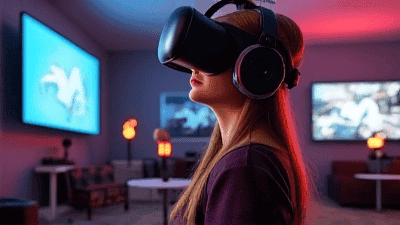
Unlocking Peak Performance: The Hidden Daily Habits Driving Pro Gamers' Elite Success
Professional gaming, once a niche hobby, has exploded into a global phenomenon, transforming passionate players into revered athletes. While the dazzling reflexes and strategic brilliance displayed on screen captivate millions, the true secret to their consistent dominance lies not just in raw talent, but in a meticulously cultivated array of unseen daily habits. These routines, often overlooked by casual observers, form the bedrock of their peak performance, revealing that esports is as much about disciplined preparation as it is about in-game prowess.
The rise of esports has created a new frontier for understanding human performance, blending traditional athletic conditioning with cutting-edge cognitive science. For sports scientists, psychologists, and aspiring players alike, comprehending these habits is crucial. It sheds light on how individuals maintain extreme focus under pressure, make split-second decisions with precision, and adapt to rapidly evolving game environments. Current developments in areas like personalized coaching, mental health support for athletes, and performance analytics are deeply intertwined with these established routines. Without a full comprehension of the holistic approach professional gamers take to their craft – encompassing physical health, mental fortitude, and structured practice – what impact would it have on our understanding or practice of human performance and competitive excellence?
The Athlete's Body: Beyond the Screen

Fueling and Conditioning for Sustained Digital Dominance
The common misconception that professional gaming is purely a sedentary activity belies the significant physical demands placed upon esports athletes. Sustained focus, rapid hand-eye coordination, and precise motor control over hours of competition require a surprisingly robust physiological foundation. Pro gamers often adhere to strict ergonomic setups, ensuring their chairs, desks, monitors, and peripherals are optimized to prevent injuries like carpal tunnel syndrome, repetitive strain injury (RSI), and chronic back pain. These setups minimize physical stress, allowing for longer, more comfortable practice sessions. Beyond ergonomics, a tailored physical exercise regimen is increasingly common. This includes cardiovascular workouts to improve blood flow and endurance, and strength training to maintain posture and prevent fatigue, especially in the neck, shoulders, and wrists. For instance, teams like Team Liquid employ dedicated sports psychologists and trainers who integrate gym routines and nutritional plans directly into their players' schedules, recognizing that a healthy body supports a healthy, responsive brain. Nutrition plays a vital role, with balanced diets focusing on lean proteins, complex carbohydrates, and essential fats to provide sustained energy and support cognitive function. Hydration is also paramount; even slight dehydration can impair focus and reaction time. Sleep, often an undervalued component, is rigorously prioritized. Adequate, high-quality sleep is crucial for cognitive restoration, memory consolidation, and optimal reaction speed, directly impacting in-game decision-making and performance consistency. It's not just about getting enough hours, but maintaining a consistent sleep schedule to align with the body's circadian rhythm.
Mastering the Mind: Strategic Acuity and Mental Resilience
Cultivating Unwavering Focus and Lightning-Fast Decision-Making
While physical health underpins endurance, it is the cultivation of an elite mindset that truly differentiates professional gamers. Their ability to maintain unwavering focus amidst chaos and execute lightning-fast, strategic decisions is a testament to rigorous cognitive and psychological training. This includes specialized drills designed to enhance reaction time, pattern recognition, and working memory, often conducted both in-game and through external cognitive training software. A cornerstone of mental development is extensive VOD (Video On Demand) review. Players meticulously analyze their own gameplay and that of opponents, identifying strengths, weaknesses, tactical errors, and emerging meta-strategies. This analytical process isn't just about spotting mistakes; it's a deep dive into decision trees, understanding cause-and-effect relationships, and internalizing optimal responses under various scenarios.
Mental resilience is equally critical, enabling players to perform under immense pressure, recover from setbacks, and manage tilt (frustration leading to poor play). Techniques such as mindfulness meditation, controlled breathing exercises, and visualization are increasingly adopted to manage stress and anxiety. For example, during high-stakes tournaments, players might employ specific breathing patterns to regain composure after a lost round. Furthermore, effective communication strategies are vital, especially in team-based games, ensuring clear, concise information exchange even in chaotic moments. The table below illustrates how dedicated mental training protocols can significantly impact various cognitive metrics, crucial for esports performance.
| Cognitive Skill | Untrained Group Score | Trained Group Score | Improvement (%) |
|---|---|---|---|
| Reaction Time (ms) | 250 | 180 | 28% |
| Decision Accuracy (%) | 75% | 92% | 17% |
| Sustained Attention (min) | 30 | 55 | 83% |
This data, often drawn from studies in sports psychology and cognitive science, highlights how targeted training can yield substantial improvements in cognitive functions directly relevant to professional gaming. A 28% reduction in reaction time, for instance, translates to a critical advantage in fast-paced esports titles, allowing players to respond faster to threats or opportunities. Similarly, enhanced decision accuracy means fewer costly in-game errors, while increased sustained attention enables peak performance throughout lengthy matches. These gains are not innate but are the result of deliberate, consistent mental conditioning, reinforcing the idea that the "mind is a muscle" that can be strengthened and refined for competitive advantage.
The Discipline of Practice: Routines and Iteration

Structuring Training for Continuous Skill Refinement and Adaptation
The journey to becoming a professional gamer is paved with relentless, deliberate practice, structured far beyond simply "playing the game." This involves meticulously planned schedules that integrate individual skill drills, team scrimmages, strategic discussions, and personal development. Each session has specific goals, whether it’s perfecting a particular in-game mechanic, mastering a new character, or refining team coordination. Feedback loops are integral to this process; coaches and teammates provide constructive criticism, and players themselves engage in self-reflection through VOD review, constantly identifying areas for improvement. This iterative cycle of practice, analysis, and adjustment is what drives continuous skill refinement. For example, a player might spend hours in a custom training map practicing specific grenade throws or movement patterns, then apply those skills in a competitive match, and finally review the effectiveness in a VOD session.
Beyond individual skill, understanding and adapting to the "meta" (the most effective strategies and characters in a given patch or period) is critical. The esports landscape is dynamic, with game updates constantly shifting optimal playstyles. Pro gamers and their teams dedicate significant time to theory-crafting, experimenting with new tactics, and developing counters to emerging strategies. This proactive adaptation prevents stagnation and ensures they remain at the forefront of competitive play. Team dynamics and synergy are also honed through structured practice. Trust, communication, and understanding teammates' playstyles are developed over countless hours of shared experience, fostering a cohesive unit that operates like a single, well-oiled machine. This disciplined approach, emphasizing specific, measurable goals and continuous learning, transforms raw talent into sustained, world-class performance.
Conclusion
The captivating spectacle of professional esports masks a rigorous reality: elite performance is the culmination of disciplined, holistic habits, extending far beyond raw in-game talent. This exploration has unveiled the three pillars supporting pro gamers' success: a robust physical foundation, a finely tuned cognitive edge, and an unwavering commitment to deliberate practice. From optimized ergonomics, nutrition, and tailored physical exercise to advanced cognitive training, stress management, and meticulous VOD review, every aspect of their lives is often aligned towards competitive excellence. Their structured routines, iterative feedback loops, and proactive adaptation to evolving game metas demonstrate that esports is not merely a game but a demanding athletic discipline. Understanding these facets emphasizes that achieving peak performance in any complex, high-pressure domain necessitates a comprehensive approach, where physical well-being, mental fortitude, and continuous, structured learning are intrinsically linked.
Looking ahead, the esports landscape is poised for even greater integration with traditional sports science and cutting-edge technology. We can anticipate further advancements in AI-driven personalized training programs, offering tailored drills and real-time performance analytics that adapt to individual player needs. The focus on mental health support and psychological conditioning will likely intensify, recognizing the immense pressure and potential for burnout faced by these athletes. Furthermore, as esports gains mainstream acceptance, research into player longevity, injury prevention, and optimized training methodologies will become increasingly sophisticated, potentially influencing traditional sports. The interdisciplinary integration of cognitive neuroscience, exercise physiology, and sports psychology will continue to deepen, uncovering new insights into human potential under extreme demands. Continued research into the "secret habits" of pro gamers will not only elevate the sport itself but also offer invaluable lessons applicable to achieving peak performance across a multitude of professional and personal endeavors.
Frequently Asked Questions (FAQ)

Q: How important is physical fitness for a professional gamer, given that their activity is primarily seated? A: Physical fitness is far more critical for professional gamers than commonly perceived, despite their seated primary activity. While the visible action occurs on a screen, the demands on a pro gamer's body are intense and sustained, leading to specific physical requirements. Prolonged periods of intense focus and rapid motor control strain the eyes, wrists, hands, and back, making them susceptible to conditions like carpal tunnel syndrome, repetitive strain injuries (RSI), and chronic back pain. A strong core and good posture, maintained through regular exercise, are essential for preventing these issues and ensuring comfort during long training sessions and tournaments. Furthermore, cardiovascular fitness is crucial for maintaining stamina. The adrenaline surges and heightened states of arousal during competitive matches can elevate heart rate and blood pressure, similar to traditional sports. A fit cardiovascular system helps manage these physiological responses, reducing fatigue and allowing players to maintain peak cognitive function and reaction times throughout extended play. Adequate nutrition, including a balanced diet and proper hydration, fuels the brain and body, impacting everything from decision-making speed to mood regulation. Finally, high-quality sleep, facilitated by physical activity, is vital for cognitive restoration, memory consolidation, and processing complex information learned during practice. Without these physical underpinnings, a gamer's mental sharpness and consistency would inevitably decline, ultimately hindering their ability to compete at an elite level.
Q: Can anyone develop the "pro gamer mindset" or is it largely an innate talent? A: While certain innate traits like exceptional hand-eye coordination or a natural aptitude for strategic thinking can provide an initial advantage, the "pro gamer mindset" is overwhelmingly a cultivated skill rather than an inherent talent. It's a complex blend of psychological attributes, cognitive abilities, and learned behaviors that are meticulously developed through deliberate practice, self-reflection, and structured training. Key components of this mindset include extreme focus, emotional regulation, resilience to pressure, analytical thinking, and adaptability. Focus, for instance, can be trained through mindfulness exercises and specific in-game drills that demand sustained attention. Emotional regulation, the ability to manage frustration ("tilt") and anxiety, is a learned skill often developed through cognitive behavioral techniques, breathing exercises, and experience. Resilience, the capacity to bounce back from losses or setbacks, is built by reframing failures as learning opportunities and maintaining a growth mindset. Analytical thinking, crucial for reviewing gameplay (VODs) and understanding complex game mechanics, is sharpened through systematic problem-solving and critical self-assessment. Even "talent" itself is often revealed to be a deep fascination or passion that drives extraordinary amounts of deliberate practice. Therefore, while some individuals might start with a slight head start, the truly elite pro gamer mindset is a testament to immense dedication, consistent effort, and a willingness to continuously learn, adapt, and push their mental boundaries, proving that it is largely achievable through focused self-improvement.








